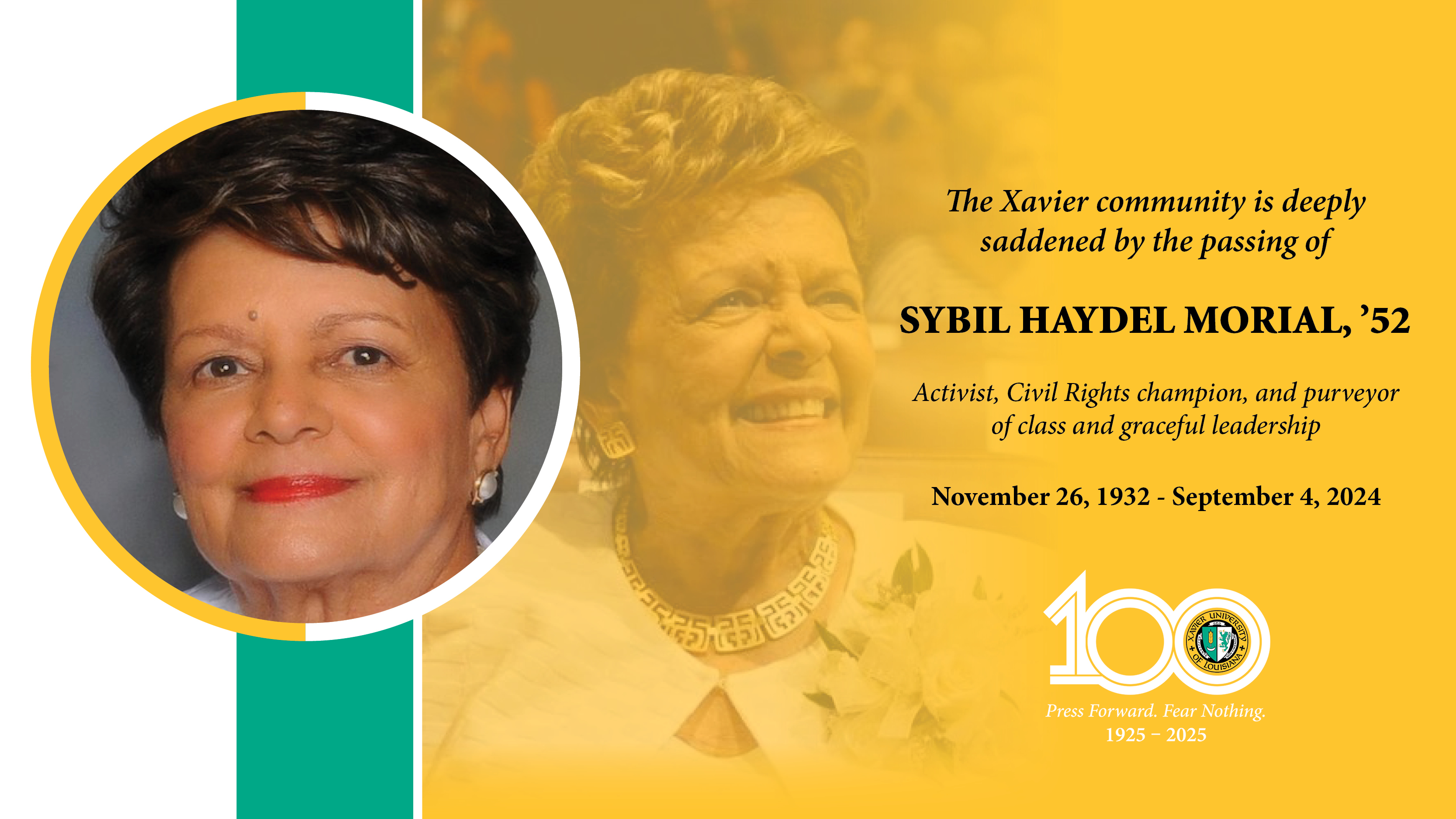
The Xavier community mourns the passing of Sybil Haydel Morial, a member of the class of 1952 and long-serving administrator at Xavier for 28 years.
An activist, Civil Rights champion, and purveyor of class and graceful leadership, Haydel Morial was shaped by her lived experience of growing up in New Orleans in the ‘30s and ‘40s, a time when Black folks weren’t free to move about at leisure. That, coupled with her curiosity, led her down the path of carving out change, not just for herself but for many, many others who benefited from her zest and spunk.
“Our love and prayers go out to the family of Sybil Haydel Morial. We remember her generous life and legacy and the deep, lasting connections that she and her family have maintained with Xavier University of Louisiana over many decades; we are inspired by her activism, leadership, steadfastness, and commitment to serve,” said Reynold Verret, Ph.D., President of Xavier University of Louisiana. “She has been neighbor to many, as taught in the parable of the Samaritan. A member of Xavier's class of 1952 and a long-serving administrator here for 28 years, our university has been greatly blessed by her intellectual and personal gifts that manifest not only on this campus but throughout New Orleans, Louisiana, and worldwide. Her gift to all is enduring, and she will be sorely missed.”
While Haydel Morial began her higher education at Xavier, she completed her undergraduate studies at Boston University, at the same time, Dr. Martin Luther King, Jr. worked on his doctoral degree. In Boston, Haydel Morial relished life outside of Deep South segregation and politics, but New Orleans still tugged at her roots. Upon the Brown V. Board of Education decision, she returned to her beloved hometown and successfully enrolled in Tulane University for two courses until they noticed ‘Negro’ checked off on her registration forms – she was asked to leave and later rejected from nearby Loyola for the same reason. This further fueled her dreams for an inclusive environment. She returned to Boston to finish her graduate studies and began her professional life.
In 1955, she married fellow Xavierite Ernest “Dutch” Morial (’51), who at the time had just become an example of Civil Rights as he had been the first African American to receive a law degree from Louisiana State University the year before wedding Haydel-Morial. He would later continue to make history as New Orleans’ first Black mayor. “Dutch,” with his fearless activist wife at his side, began a career of prominence in civic engagement in the fight for equity and equality.
Racial rejection continued to rev Haydel Morial’s quest, and upon being disqualified from membership in the League of Women Voters, she and several other women formed their own organization, CiCulSo (Civic, Cultural, and Social Organization). The organization evolved into the Louisiana League of Good Government –a racially inclusive group of women that pursued voting rights and ensured voter rolls included Black people. As tensions rose in the '60s, Haydel Morial fought even harder. In 1963, she filed lawsuits against the Orleans Parish School Board for enforcing a law that prevented Orleans Parish teachers from advocating for integration or belonging to associations that favored integration. As a New Orleans Public Schools teacher, she offered cultural awareness as a Civil Rights champion and community organizer.
In 1977, Haydel Morial returned to Xavier University of Louisiana, where she served for 28 years, retiring in 2005 as Vice President for External Affairs. Throughout the decades, the Haydel Morial family has been deeply connected to Xavier in various capacities, encompassing time, talent, and treasure.
In an interview for The Xavier Story Project, Haydel Morial reflected on the significance of returning to New Orleans in the wake of civic uprisings and, ultimately, Xavier's legacy. “Even though we loved the freedoms of the North, we all wanted to go back to the South to be a part of the change when it came. And we did.” Haydel Morial also talked about her beloved HBCU and the cultural hub it was, from creating opera opportunities for Black singers to being a haven for the Freedom Riders, among other significant civic engagement and equitable efforts.
Haydel-Morial was 92 years old.